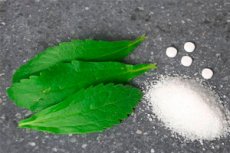New publications
From Sweetener to Cancer Cure? Fermented Stevia Shows Potential in Fighting Pancreatic Cancer
Last reviewed: 27.07.2025

All iLive content is medically reviewed or fact checked to ensure as much factual accuracy as possible.
We have strict sourcing guidelines and only link to reputable media sites, academic research institutions and, whenever possible, medically peer reviewed studies. Note that the numbers in parentheses ([1], [2], etc.) are clickable links to these studies.
If you feel that any of our content is inaccurate, out-of-date, or otherwise questionable, please select it and press Ctrl + Enter.

In an unexpected twist in the fight against cancer, a humble kitchen bacteria and a plant known as a natural sweetener may one day play a role in treating one of humanity's deadliest diseases.
A team of Japanese scientists has found that fermented stevia, a plant widely used as a low-calorie sugar substitute, may have significant anti-cancer properties. Although the results are preliminary and require further research, they raise the prospect of using stevia in pancreatic cancer therapy.
Pancreatic cancer remains one of the most difficult cancers to treat. Symptoms usually appear at a late stage of the disease, and traditional treatments such as chemotherapy rarely lead to a cure. The prognosis remains extremely poor: less than 10% of patients survive more than five years after diagnosis.
The urgent need for more effective and less toxic treatments is driving scientists to look to natural compounds for solutions. Many anti-cancer drugs are plant-based—for example, paclitaxel from the bark of the Pacific yew tree and vincristine from the catharanthus—proving the effectiveness of this approach.
Stevia, a leafy plant native to South America, is known for its natural sweetness and is widely used in the food industry. However, its medicinal properties have long been overlooked. Although stevia leaves are rich in bioactive compounds, including antioxidants and potential anti-cancer effects, their effectiveness in crude extracts has been limited—large doses are required to affect cancer cells.
Fermentation is the key stage
Fermentation, known from products like yogurt, kimchi, and sourdough, is more than just a culinary process, but a kind of “microbial alchemy” that can transform plant compounds into new biologically active forms.
Researchers at Hiroshima University asked themselves a simple but original question: what if stevia were fermented with the right bacteria? Experiments with Lactobacillus plantarum SN13T, a relative of the bacteria found in fermented foods, produced a stevia extract containing chlorogenic acid methyl ester (CAME). This compound showed significantly stronger anti-cancer effects than unfermented stevia.
In laboratory tests, the extract caused the death of large numbers of pancreatic cancer cells while leaving healthy kidney cells largely unaffected. Analysis showed that CAME was responsible for this effect: it blocked cancer cell division and triggered apoptosis, or programmed cell death.
Molecular mechanism of action
CAME affects the genetic program of cells, activating genes responsible for self-destruction and suppressing genes that support the growth and survival of tumor cells. This “double whammy” slows down the progression of cancer and triggers the mechanisms of cell self-destruction.
What’s more, the fermented extract was found to be a more powerful antioxidant than the raw extract. Given that oxidative stress and free radicals play a role in cancer development, this may provide additional protection for healthy cells.
Although similar benefits have been noted with fermented soy and ginseng, stevia stands out for its selectivity: it kills cancer cells while leaving healthy ones largely untouched. This has long been considered the “holy grail” of oncology.
It is important to emphasize that the results were obtained in a laboratory setting on cell culture, not in animals or humans. Many substances that have shown effectiveness in a test tube do not undergo clinical trials. However, the discovery remains promising and deserves further study.
The work highlights the potential of everyday foods and natural microbes as sources of new medicines. There is also growing interest in “microbial biotransformation” – using beneficial bacteria to create powerful substances from plants.
In the case of stevia, the search for a natural sweetener could lead to the creation of a new anti-cancer drug that is affordable, safe, and targets malignant cells.
The study is published in the journal Molecular Sciences.
